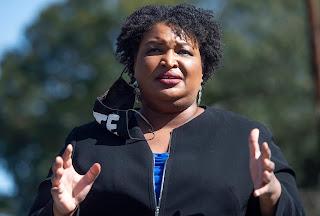
Stacey Abrams
Part Two
What are the chances of a former UT-Chattanooga (UTC) football coach winning a lawsuit for being fired after he made "fat jokes" on Twitter about Georgia political figure Stacey Abrams? Based on our research of the applicable law, the chances are slim and very slim.
Chris Malone, former offensive line coach at UTC, referred to Abrams as "Fat Albert," suggested she had cheated in an election, "again!!!", and encouraged her to "enjoy the buffet, Big Girl! You earned it!!!" As a parting shot, Malone added "hope the money was good. Still not governor."
Malone deleted the tweet after former players reacted negatively to it, but head coach Rusty Wright quickly said the issue had "gone over his head," and the administration fired Malone. The former line coach apparently never considered that former players, many of whom probably were Black, might find it offensive to see insults lobbed at a political figure of color who is considered by many to be highly talented and effective. In fact, many observers have credited Abrams with enhancing voter turnout that put Georgia in the victory column for Joe Biden in the 2020 presidential election. (Something tells me Malone did not vote for Biden.)
The former players' reaction points to the second of two reasons we think Malone is destined to lose his lawsuit. Let's look at the No. 1 reason first. While employees at private entities can be fired for just about any non-discriminatory reason ("a good reason, bad reason, or no reason at all," lawyers like to say), public employees -- including those who work at a state university, such as UTC -- generally enjoy First Amendment protection to comment "on matters of public concern." Here is how it's expressed at The First Amendment Encyclopedia:
Public employees have a right to speak out on matters of public concern or importance as long as the expression is not outweighed by the employer’s interest in an efficient, disruption-free workplace.
Stacey Abrams certainly is a public figure, and if she were inclined to bring a defamation lawsuit against Malone, she probably would not prevail. But an employment case is not about how Abrams feels about the insults; it's about how Malone's superiors at UTC feel about them -- specifically if they feel Malone's comments were a matter of public concern. Obviously, UTC administrators did not like the comments because they fired Malone. But more importantly, they likely did not consider his "fat jokes" to be a matter of public concern. Would UTC have had grounds to fire Malone if he had commented negatively, in a fairly thoughtful way, about Abrams' performance as a public official? Probably not. But is it a matter of public concern that Abrams might be considered overweight or might enjoy an occasional trip to a buffet? Almost certainly not, so it's hard to see how Malone has any "public concern" protection.
As for the second provision of law we noted above, it has to do with Malone's ability to do his job. A key part of the job for any college football coach is recruiting, and that means effectively attracting promising Black student-athletes. Courts long have held that "the State, as an employer, [has an interest] in promoting the efficiency of the public services it performs through its employees. Here is how the law has developed on the "efficiency" front:
In 2006, the U.S. Supreme Court added a threshold requirement for public employees who assert free-speech retaliation claims. In Garcetti v. Ceballos (2006), the Court ruled that public employee speech made as part of routine job duties also has no First Amendment protection. The key inquiry is whether an employee’s speech is part of her official job duties.Many lower courts have used a “core functions” test.In other words, if the employee’s speech is part of the core functions of her job, the speech is not protected.
We have noted that recruiting student-athletes of all colors was a central part of Malone's job -- and that means building and maintaining good relationships with Black football players and their families is part of his official job duties. Was insulting Stacey Abrams a good way to build those relationships? Given that former players already had complained about the tweets, the answer appears to be no. UTC likely will argue in court that Malone's comments were not a matter of public concern, and they would make it impossible for him to perform his duties as a football coach. We suspect the university will be on solid legal footing with that argument.
